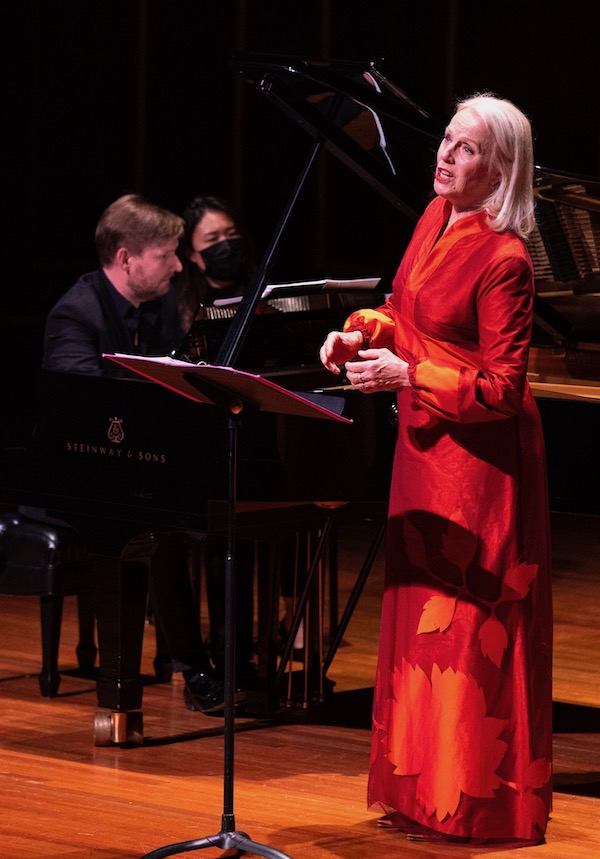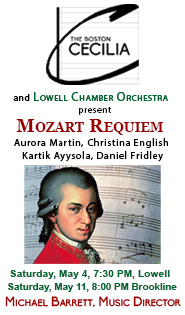Von Otter, Bezuidenhout deliver surprises, rich musical pleasures for Celebrity Series

Anne Sofie von Otter performed a recital with pianist Kristian Bezuidenhout Saturday night at Jordan Hall for the Celebrity Series. Photo: Robert Torres
It’s not every night that a song by Harvey Schmidt goes to-to-toe with one by Franz Schubert and comes out ahead. Then again, it’s not every night that Anne Sofie von Otter comes to town and sings “Try to Remember” in English and Swedish.
The selection was the second of two encores von Otter and pianist Kristian Bezuidenhout offered at the end of their joint recital Saturday at Jordan Hall (the first was Schubert’s “Lachen und Weinen”). If it felt a tad out of place, stylistically, the number certainly clicked, expressively.
Technically, too: any periodic concerns that emerged during the night regarding the state of von Otter’s instrument—moments of thin tone, an unpowered climax or two, occasional imbalances between voice and keyboard—simply melted away. This was three minutes of pure, unaffected music-making.
Not that the core of von Otter’s program—a traversal of sixteen lieder by Schubert and Adolf Fredrik Lindblad—wanted for spirit or color. To be sure, the Swedish mezzo-soprano’s performance offered both: at 67, von Otter is still a preeminent interpreter of this fare. Her voice remains, for the most part, astonishingly supple and even, as the night’s program broadly demonstrated.
In a trio of Schubert’s Goethe settings—“Nur wer die Sehnsucht kennt,” “Heiss mich nicht reden,” and “So lasst mich scheinen”—von Otter sang with a blend of laser-like focus, dramatic fervor, and, especially in the last, captivating serenity. Suffice it to say, these meditations on loss, longing, and yearning for oblivion felt lived in. So, too, the mournful play of memories in “An den Mond” and the melancholy storyline of “Nachtstück” (about a man wandering in the woods at night, searching for death).
If parts of “Der Einsame” and “Der Geistertanz” took some time to settle, at least the latter offered low-tessitura moments that spoke strongly and a compelling sense of that lied’s macabrely playful spirit. Ultimately, it tripped nicely, as did von Otter’s account of “Die Taubenpost.”
Similar concentration marked the five songs by Lindblad. Written between 1838 and 1860, the set provided a broad overview of the prolific 19th-century Swedish composer’s output, all warmly and flexibly sung. In several items—notably “Butterfly Orchid,” “Would You Think? Indeed!,” and “Journeying to the Wedding”—von Otter was firmly and grippingly in her element: her realization of the epic character of the last verged, winningly, on the theatrical.
Through it all, Bezuidenhout proved a superb accompanist. In Schubert, his playing was consistently poetic, both in extroverted moments—like the quizzical, hesitating gestures of “Der Geistertanz” and the limber figurations in “Die Taubenpost”—and the introspective. His lean, stately account of the keyboard writing in “Der Tod und das Mädchen” provided a perfect foil for von Otter’s nobly icy recitation of Death’s text. Bezuidenhout’s engagement with the Lindblad songs was likewise discreet, nowhere more so than the inward, dreamy account of the “Lullaby.”
The pianist also took the stage by himself for three works.
In Wolfgang Mozart’s meditative Rondo in A minor (K. 511), Bezuidenhout’s interpretation was pearl-toned and gently dancing, its flawless balances underlining the music’s peripatetic structure.
Similar qualities marked his reading of the Allegretto quasi andantino from Schubert’s A-minor Piano Sonata (D. 537). As in the Mozart, each section of this rondo was strongly characterized and the music’s various harmonic areas took on their own, distinct colors.
Meanwhile, in the Andante from Schubert’s A-major Sonata (D. 664), Bezuidenhout’s improvisatory approach called to mind, periodically, jazz: his voicing of certain of the movement’s landing points suggested an early 19th-century Bill Evans.
While von Otter was clearly the evening’s star, Bezuidenhout’s exceedingly fine pianism was a pleasant bonus. Taken with von Otter’s affecting singing that ended up on Broadway, Saturday’s was a journey down familiar paths that, ultimately, led to some unexpected places.
The Celebrity Series presents the Berlin Philharmonic Orchestra playing music by Andrew Norman, Wolfgang Mozart, and Erich Wolfgang Korngold 8 p.m. November 13 at Symphony Hall. celebrityseries.org
Posted in Performances

